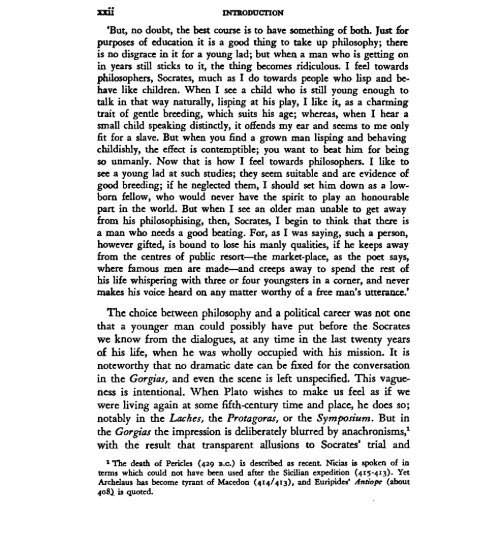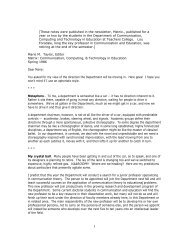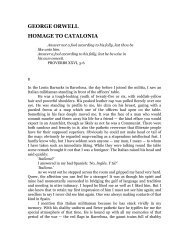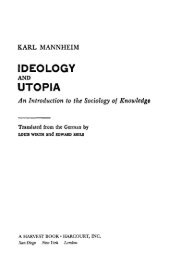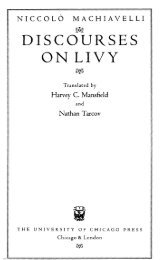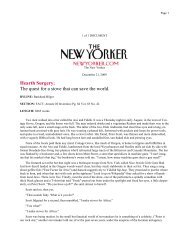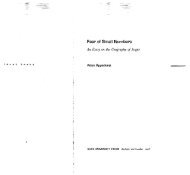THE REPUBLIC OF PLATO - Studyplace
THE REPUBLIC OF PLATO - Studyplace
THE REPUBLIC OF PLATO - Studyplace
You also want an ePaper? Increase the reach of your titles
YUMPU automatically turns print PDFs into web optimized ePapers that Google loves.
IN'l1l0DUCTJON<br />
'But, no doubt, the best course is to have something of both. Just £'or<br />
purposes of education it is a good thing to take up philosophy; there<br />
is no disgrace in it for a young lad; but when a man who is getting on<br />
in years still sticks to it, the thing becomes ridiculous. I feel towards<br />
philosophers, Socrates, much as I do towards people who lisp and behave<br />
like children. When I see a child who is still young enough to<br />
talk in that way naturally, lisping at his play, I like it, as a charming<br />
trait of gende breeding, which suits his age; whereas, when I hear a<br />
small child speaking distincdy, it offends my ear and seems to me only<br />
fit for a slave. But when you find a grown man lisping and behaving<br />
childishly, the effect is contemptible; you want to beat him for being<br />
so unmanly. Now that is how I feel towards philosophers. I like to<br />
see a young lad at such studies; they seem suitable and are evidence of<br />
good breeding; if he neglected them, I should set him down as a lowborn<br />
fellow, who would never have the spirit to play an honourable<br />
part in the world. But when I see an older man unable to get away<br />
from his philosophising, then, Socrates, I begin to think that there is<br />
a man who needs a good beating. For, as I was saying, such a person,<br />
however gifted, is bound to lose his manly qualities, if he keeps away<br />
from the centres of public resort-the market-place, as the poet says,<br />
where famous men are made--and creeps away to spend the rest of<br />
his life whispering with three or four youngsters in a corner, and never<br />
makes his voice heard on any matter worthy of a free man's utterance.'<br />
The choice between philosophy and a political career was not one<br />
that a younger man could possibly have put before the Socrates<br />
we know from the dialogues, at any time in the last twenty years<br />
of his life, when he was wholly occupied with his mission. It is<br />
noteworthy that no dramatic date can be fixed for the conversation<br />
in the Gorgias, and even the scene is left unspecified. This vagueness<br />
is intentional. When Plato wishes to make us fed as if we<br />
were living again at some fifth-century time and place, he does so;<br />
notably in the Laches, the Protagoras, or the Symposium. But in<br />
the Gorgias the impression is ddiberatdy blurred by anachronisms,!<br />
with the result that transparent allusions to Socrates' trial and<br />
1 The death of Pericles (429 D.C.) is described as recent. Nicias is spoken of in<br />
terms which could not have been used after the Sicilian expedition (415-413). Yet<br />
Archdaus has become tyrant of Macedon (414/413), and Euripides' AfJtio~ (about<br />
4081 is quoted.


